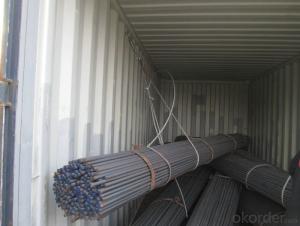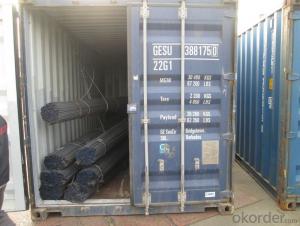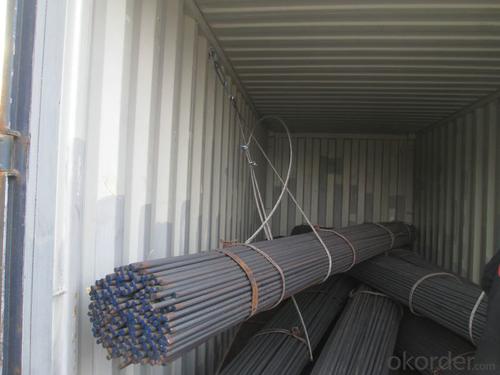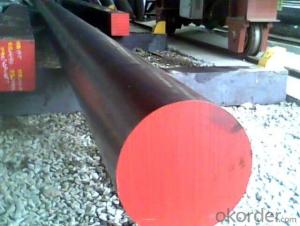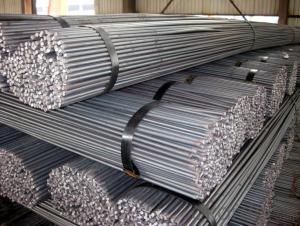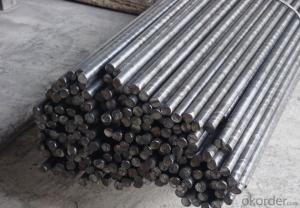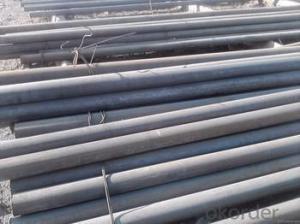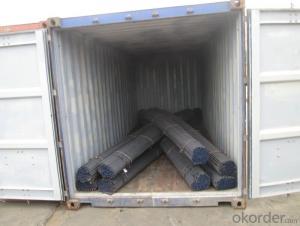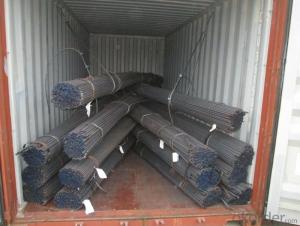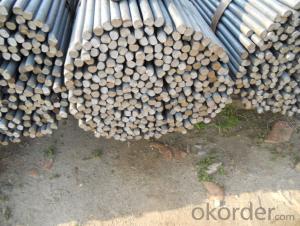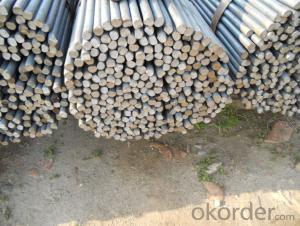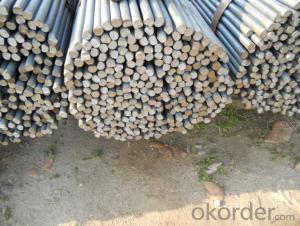Round Bar Multiple Steel Grade with High Quality and Competitive Prices for Sale
- Loading Port:
- Tianjin
- Payment Terms:
- TT OR LC
- Min Order Qty:
- 25 m.t.
- Supply Capability:
- 2000 m.t./month
OKorder Service Pledge
OKorder Financial Service
You Might Also Like
Specification
Product Description:
OKorder is offering Round Bar Multiple Steel Grade with High Quality and Competitive Prices for Sale at great prices with worldwide shipping. Our supplier is a world-class manufacturer of steel, with our products utilized the world over. OKorder annually supplies products to European, North American and Asian markets. We provide quotations within 24 hours of receiving an inquiry and guarantee competitive prices.
Product Applications:
Round Bar Multiple Steel Grade with High Quality and Competitive Prices for Sale are ideal for structural applications and are widely used in the construction of buildings and bridges, and the manufacturing, petrochemical, and transportation industries.
Product Advantages:
OKorder's Round Bar Multiple Steel Grade with High Quality and Competitive Prices for Sale are durable, strong, and resist corrosion.
Main Product Features:
· Premium quality
· Prompt delivery & seaworthy packing (30 days after receiving deposit)
· Corrosion resistance
· Can be recycled and reused
· Mill test certification
· Professional Service
· Competitive pricing
Packaging & Delivery:
Packaging Detail: products are packed in bundle and then shipped by container or bulk vessel, deformed bar is usually naked strapping delivery, when storing, please pay attention to moisture proof. The performance of rust will produce adverse effect.
Each bundle weight: 2-3MT, or as required
Payment term: TT or L/C
Delivery Detail: within 45 days after received advanced payment or LC.
Label: to be specified by customer, generally, each bundle has 1-2 labels
Trade terms: FOB, CFR, CIF
FAQ:
Q1: How do we guarantee the quality of our products?
A1: We have established an advanced quality management system which conducts strict quality tests at every step, from raw materials to the final product. At the same time, we provide extensive follow-up service assurances as required.
Q2: Why buy Materials & Equipment from OKorder.com?
A2: All products offered byOKorder.com are carefully selected from China's most reliable manufacturing enterprises. Through its ISO certifications, OKorder.com adheres to the highest standards and a commitment to supply chain safety and customer satisfaction.
Q3: How soon can we receive the product after purchase?
A3: Within three days of placing an order, we will begin production. The specific shipping date is dependent upon international and government factors, but is typically 7 to 10 workdays.
Images:
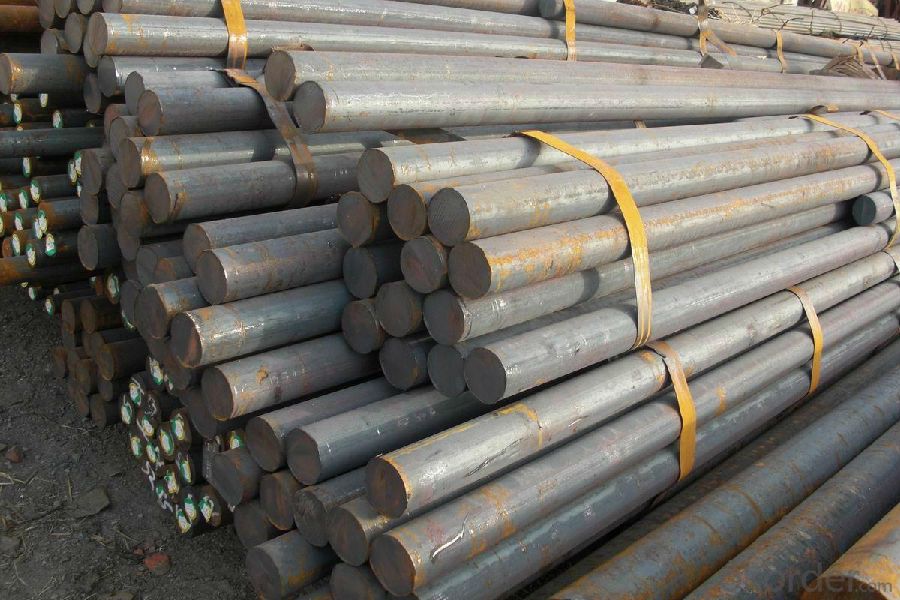
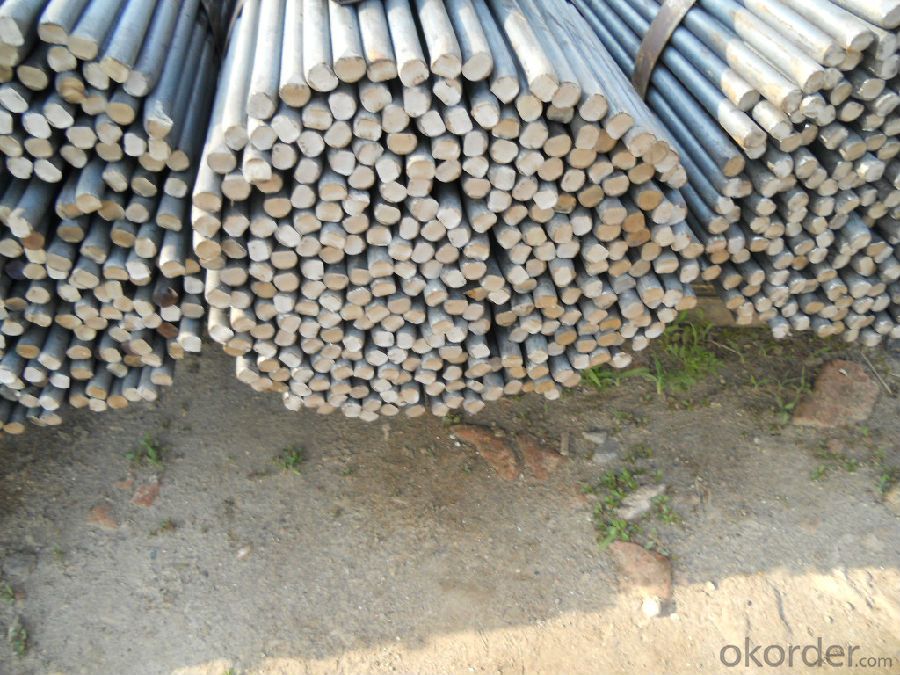
- Q: Can steel round bars be used in high-temperature applications?
- Yes, steel round bars can be used in high-temperature applications. Steel is known for its strength and durability, and it can withstand high temperatures without deformation or loss of structural integrity. However, the specific type of steel and its composition will determine its suitability for high-temperature applications. Stainless steel, for example, has excellent heat resistance and can be used in a wide range of high-temperature environments. Additionally, certain alloy steels are specifically designed for use in high-temperature applications, such as those found in the aerospace or petrochemical industries. It is important to consult with experts and consider the specific requirements of the application to ensure the appropriate steel round bars are chosen for high-temperature conditions.
- Q: What are the different types of steel round bars used in the automotive chassis components?
- There are several different types of steel round bars used in automotive chassis components, including carbon steel, alloy steel, stainless steel, and tool steel. Each type of steel offers different properties and strengths, allowing for the production of reliable and durable chassis components.
- Q: What are the different heat treatment methods for steel round bars?
- Steel round bars can undergo various heat treatment methods to enhance their mechanical properties and overall performance. These methods, namely annealing, normalizing, quenching, tempering, and case hardening, are commonly employed. 1. Annealing: By subjecting the steel round bars to a specific temperature and maintaining it for a certain duration, annealing achieves a uniform microstructure. This treatment alleviates internal stresses, improves ductility, and enhances machinability. 2. Normalizing: This technique involves heating the steel round bars slightly above their critical transformation temperature and subsequently cooling them in still air. Normalizing refines the grain structure, enhances mechanical properties, and improves resistance to impact and fatigue. 3. Quenching: The process of quenching entails heating the steel round bars above their critical temperature and rapidly cooling them by immersion in a quenching medium like oil, water, or brine. This rapid cooling hardens the steel, rendering it stronger and more resistant to wear and abrasion. However, quenched steel may exhibit brittleness, necessitating additional heat treatment steps. 4. Tempering: Following the quenching process, tempering is often employed to reduce brittleness and enhance toughness. Tempering involves reheating the quenched steel to a specific temperature and holding it there for a designated time, followed by gradual cooling. This procedure alleviates internal stresses, improves ductility, and enhances overall toughness and machinability. 5. Case Hardening: Case hardening is a surface heat treatment method that increases the hardness of the outer layer of steel round bars while maintaining a relatively softer core. This technique involves heating the steel in a carbon-rich environment, such as a gas or salt bath, and subsequently quenching it to achieve a hardened outer layer. Case hardening improves wear resistance and fatigue strength, making it suitable for applications requiring high surface hardness. It is crucial to note that the selection of the specific heat treatment method for steel round bars depends on the desired mechanical properties and intended application. Manufacturers meticulously choose the appropriate heat treatment method based on factors such as steel composition, desired hardness, and required strength.
- Q: Can steel round bars be used in the manufacturing of electrical components?
- Yes, steel round bars can be used in the manufacturing of electrical components. Steel is a versatile material that offers excellent strength and durability, making it suitable for various applications, including the production of electrical components. Steel round bars can be used as connectors, terminals, or brackets in electrical devices and equipment. They provide stability, support, and protection to the electrical components, ensuring their proper functioning and longevity. Additionally, steel can be easily machined, welded, and shaped, allowing manufacturers to customize the round bars according to the specific requirements of the electrical components. However, it is important to note that steel round bars may need to be properly insulated or coated to prevent any electrical conductivity or interference, depending on the specific application and environment in which they are used.
- Q: What are the common alloying elements used in steel round bars?
- The common alloying elements used in steel round bars are carbon, manganese, silicon, sulfur, and phosphorus. Carbon is the most important alloying element and is responsible for the strength and hardness of the steel. It enhances the overall performance and makes the steel more durable and resistant to wear and tear. Manganese is another crucial element that improves the hardenability and strength of the steel. It also helps in reducing the brittleness and increasing the toughness of the material. Silicon is added to enhance the steel's resistance to oxidation, while sulfur and phosphorus are added in small amounts to improve machinability. These alloying elements work together to create steel round bars with specific properties suitable for various applications in industries such as construction, automotive, and manufacturing.
- Q: What is the difference between hot rolled and cold rolled steel round bars?
- The production methods and resulting qualities of hot rolled and cold rolled steel round bars differ. Hot rolled steel round bars are created by heating billets or ingots to a high temperature and shaping them into the desired form using rolling mills. This process yields a scaled surface and a relatively rough texture. The dimensions of hot rolled steel round bars have a wider tolerance and are less precise. They are commonly used in applications where precision is not crucial, such as construction and general manufacturing. In contrast, cold rolled steel round bars are produced by cooling down hot rolled steel to room temperature and subjecting it to further processing through cold rolling mills. This process leads to a smoother surface and more accurate dimensions. Cold rolled steel round bars have a tighter tolerance and are frequently employed in applications that require precision, like automotive components, machinery parts, and tools. Regarding mechanical properties, hot rolled steel round bars generally possess lower tensile strength and yield strength compared to cold rolled steel round bars. Cold rolled steel also tends to have higher hardness and a more uniform grain structure, which can enhance its strength and durability. In summary, the primary distinction between hot rolled and cold rolled steel round bars lies in their production process, surface finish, dimensional accuracy, and mechanical properties. The selection between the two depends on the specific requirements of the application and the desired qualities of the final product.
- Q: Can steel round bars be machined?
- Yes, steel round bars can be machined. Machining is a process that involves the removal of material from a workpiece to create the desired shape, size, or finish. Steel round bars are commonly machined to create various components, such as shafts, bolts, and fasteners. Machining processes such as turning, milling, drilling, and grinding can be used to shape and cut the steel round bars. However, the machinability of steel can vary depending on factors such as the composition and hardness of the steel, cutting tools, and machining parameters. It is important to use appropriate machining techniques and tools to ensure accurate and efficient results while machining steel round bars.
- Q: How do you prevent steel round bars from warping during machining?
- To prevent warping of steel round bars during machining, there are multiple measures that can be implemented: 1. Opt for appropriate material selection: Select steel round bars with minimal residual stress and a consistent internal structure. This will decrease the likelihood of warping during machining. 2. Prioritize stress relief before machining: Prior to machining, subject the steel round bars to stress-relieving heat treatment. This procedure assists in releasing internal stress and stabilizing the material, resulting in reduced warping. 3. Ensure proper machine setup: Guarantee that the machine used for machining the steel round bars is accurately calibrated and aligned. Any misalignment or imbalance can induce stress and lead to warping. Regular maintenance and inspection of machine components are crucial. 4. Employ suitable cooling techniques: While machining, employ appropriate cooling methods to control the temperature. Excessive heat buildup can cause thermal distortion and warping. Implementing lubricants and coolants effectively dissipates heat, maintaining stable machining conditions. 5. Utilize the correct cutting tools: Utilize high-quality cutting tools specifically designed for machining steel. Dull or incorrect tools generate excessive heat and contribute to warping. Regular inspection and replacement of tools are essential for optimal performance. 6. Adjust cutting parameters appropriately: Modify cutting parameters such as cutting speed, feed rate, and depth of cut according to the specific steel grade and machining operation. Inappropriate cutting parameters generate excessive heat and increase the risk of warping. 7. Minimize interrupted cuts: Whenever possible, avoid interrupted cuts as they create stress concentrations and raise the probability of warping. If interrupted cuts are necessary, employ proper tool entry and exit strategies to minimize stress points. 8. Implement post-machining stress relief: After machining, subject the steel round bars to stress-relieving heat treatment once again to alleviate any residual stresses induced during the machining process. This step further reduces the chances of warping. By adhering to these preventive measures, the risk of steel round bars warping during machining can be significantly reduced, ensuring the production of high-quality and precise machined components.
- Q: Can steel round bars be used in the manufacturing of tools and equipment?
- Steel round bars are capable of being utilized in the production of tools and equipment. Steel is a favored material selection for the fabrication of tools and equipment because of its remarkable strength, durability, and adaptability. Steel round bars can be effortlessly molded, severed, and shaped into various tool components such as shafts, handles, and blades. Moreover, steel's elevated tensile strength and resistance to deterioration render it appropriate for demanding applications. It can endure the forces and strain involved in tool usage, ensuring a lengthy lifespan and reliable performance. Additionally, steel's ability to undergo heat treatment and hardening permits the creation of tools with heightened hardness and toughness, resulting in greater effectiveness in cutting, shaping, or gripping tasks. On the whole, steel round bars are a prevalent and extensively employed material in the production of tools and equipment due to their strength, durability, and adaptability.
- Q: What are the different types of steel round bars used in the manufacturing of gears?
- There are several different types of steel round bars that are commonly used in the manufacturing of gears. These include: 1. Carbon steel round bars: Carbon steel is one of the most commonly used materials in gear manufacturing. It offers good strength, wear resistance, and durability, making it suitable for a wide range of gear applications. 2. Alloy steel round bars: Alloy steel is a type of steel that contains additional alloying elements such as chromium, nickel, or molybdenum. These elements enhance the mechanical properties of the steel, including its strength, toughness, and resistance to wear and fatigue. Alloy steel round bars are often used in high-performance gears that require superior strength and durability. 3. Stainless steel round bars: Stainless steel is known for its corrosion resistance and high strength-to-weight ratio. It is often used in gear manufacturing applications where resistance to rust and corrosion is important, such as in marine or outdoor equipment. 4. Tool steel round bars: Tool steel is a type of high-carbon steel that is specifically designed to be used in cutting tools, molds, and dies. It has excellent hardness, wear resistance, and toughness, making it suitable for the manufacturing of gears that undergo heavy loads and high temperatures. 5. Case-hardened steel round bars: Case hardening is a heat treatment process that creates a hard surface layer on the steel, while maintaining a tough and ductile core. Case-hardened steel round bars are often used in gear manufacturing to provide a wear-resistant surface and improve the overall strength and durability of the gears. The choice of steel round bar for gear manufacturing depends on various factors, such as the specific application, desired mechanical properties, and budget constraints. It is important to select the appropriate type of steel that meets the requirements of the gear in terms of strength, wear resistance, and durability to ensure optimal performance and longevity.
Send your message to us
Round Bar Multiple Steel Grade with High Quality and Competitive Prices for Sale
- Loading Port:
- Tianjin
- Payment Terms:
- TT OR LC
- Min Order Qty:
- 25 m.t.
- Supply Capability:
- 2000 m.t./month
OKorder Service Pledge
OKorder Financial Service
Similar products
Hot products
Hot Searches
Related keywords
